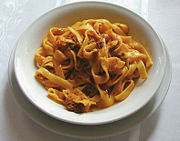- Bolognese
-
Ragù alla bolognese [raˈgu ˌalːaboloɲˈɲeːse] ist ein gehaltvolles Ragout, das vorwiegend zu Nudeln (z. B. Tagliatelle, Maccheroni oder Penne) gereicht wird. Es stammt aus dem norditalienischen Bologna und ist auch unter dem französischen Namen Sauce bolognaise bekannt. In Deutschland und auch in anderen Ländern werden häufig Spaghetti mit Ragù alla bolognese (Spaghetti bolognese) angeboten, was in Italien unüblich ist.
Zubereitet wird es aus Hackfleisch vom Rind (oder einer Mischung von Rind, Kalb und Schwein – in traditionellen Rezepten auch mit Geflügelleber), feingehackter Zwiebel und Möhre, feingehacktem Bleichsellerie und Speck, die in Butter (auch gemischt mit Olivenöl) gedünstet werden. Dazu kommen Rotwein und Tomaten oder Tomatenmark. Als Gewürze dienen neben Salz und Pfeffer auch Gewürznelken oder Muskatnuss. Zur Bindung kann etwas Milch und Mehl hinzugegeben werden. Das Ragout wird bei niedriger Temperatur mehrere Stunden gegart und sollte am Ende von dickflüssiger Konsistenz sein.
Eine Variante wird ohne Tomaten und Milch, aber mit Geflügelleber und Sahne hergestellt.
Ragù alla bolognese ist häufig auch Bestandteil von Lasagne und ähnlichen Gerichten.
Geschichte
Abgeleitet ist ragù von dem französischen Wort Ragout, das zur Zeit der Renaissance in der Region der Emilia-Romagna übernommen wurde, und zwar zunächst als Bezeichnung für ein Schmorgericht. Seit dem 19. Jahrhunderts ist ragù eine Beilage zu Makkaroni und ähnlichen Nudeln. Die Sauce ist vor allem in Bologna populär, aber es gibt auch das Ragù alla napoletana, das sehr ähnlich ist. Der Unterschied besteht darin, dass das Fleisch nach dem Kochen aus der Sauce genommen und dann separat als zweiter Gang nach der Pasta gegessen wird.[1]
Einzelnachweise
- ↑ John Mariani, The Dictionary of Italian Food and Drink, New York 1998, Artikel Ragù
Wikimedia Foundation.

